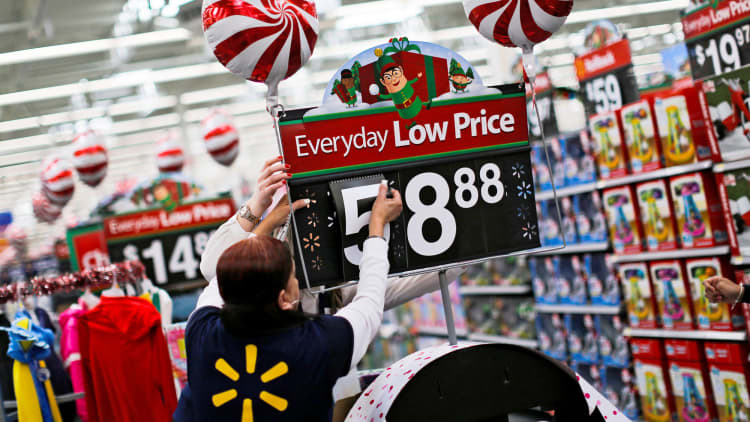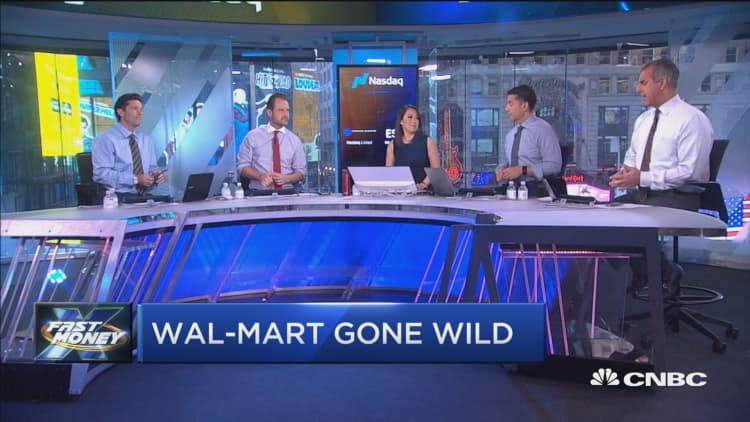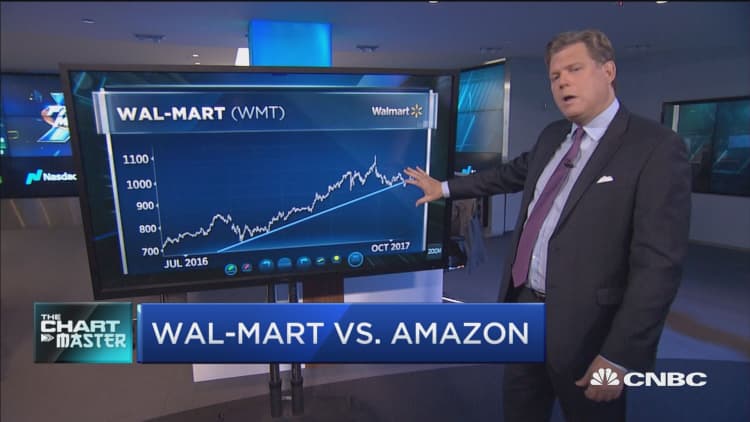
Wal-Mart trading volume was huge today, more than three times normal as investors love the emphasis on e-commerce and another massive $20 billion buyback.
You can buy a lot of Wal-Mart stock for $20 billion. It's about 8 percent of the shares outstanding at the current price, but it doesn't even come close to the biggest buybacks ever announced:
Biggest buybacks ever
GE (2015) $50 billion
Apple (2017) $50 billion
Apple (2015) $50 billion
Apple (2013) $50 billion
Microsoft (2013) $40 billion
Microsoft (2006) $40 billion
Microsoft (2008) $40 billion
Still, what's important is that Wal-Mart is part of an elite group of large-cap companies I call "buyback monsters" that have bought back huge amounts of their stock in the last decade or so. Their ranks include IBM, Microsoft, Kohl's, Target, and Boeing:
Buyback monsters
(% of shares bought back)
Wal-Mart (since 2002) 30 percent
ExxonMobil (since 2000) 41 percent
IBM (since 1998) 53 percent
Kohl's (since 2006) 50 percent
Target (since 2004) 40 percent
Boeing (since 1999) 39 percent
What does it mean? It means that these companies have dramatically boosted their earnings, not by selling more stuff, but by buying back stock. It means that all other things being equal, Wal-Mart, for example, has improved its earnings by 30 percent since 2002 just by buying back stock.

This sounds like a great deal for stock holders. But does buying back stock really cause stock prices to outperform? If it really does help boost earnings, why don't we just buy the companies that have bought back the most stock?
It's a tough question to answer, but, as with everything, there's an ETF for that. And the evidence is it can be a big help, but without improvement in fundamentals, investors are not going to be fooled.
There are two ETFs that specialize in buybacks: The Powershares BuyBack Achievers Index (PKW) is comprised of U.S. securities issued by corporations that have effected a net reduction in shares outstanding of 5 percent or more in the trailing 12 months. And the SPDR Buyback Index (SPYB) is designed to measure the performance of the top 100 stocks with the highest buyback ratios in the S&P 500.
OK, so far so good. What's the verdict?
Buybacks vs. the markets
(YTD)
S&P 500 up 13.8 percent
SPDR Buyback (SPYB) up 11.0 percent
PowerShares Buyback (PKW) up 11.3 percent
Well, that's underwhelming. There is no outperformance. It's the same if you go back two years.
It's possible there are too many companies in the ETFs. Both have over 100. But I think there's a bigger problem. Buybacks do not guarantee stock price hikes.
Just look at General Electric, which has bought back 15 percent of its stock just since the start of 2016. It's down 20 percent in that same period.
And look at Kohl's, Target, and IBM. Buyback monsters, all of them, but the fundamentals are awful, and buybacks did not save them. All three are down double-digits this year.
In contrast, Apple's business has been great, as has Microsoft. Both are also buyback monsters, and they are up huge this year.
The lesson: Stock buybacks can boost earnings, but without underlying fundamentals, it's not worth chasing them. Wal-Mart's buyback was certainly a big help, but without the added bonus of additional investments in the e-commerce business, it wouldn't have been a long-term boost.
WATCH: The battle between Wal-Mart & Amazon



